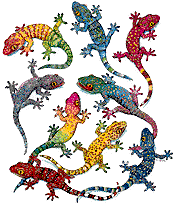
BLOOD BATTALION. Alligator blood harbors proteins that show promise for fighting several disease-causing microbes, including methicillin-resistant bacteria.
U.S. Fish & Wildlife Service
Posted on 04/12/2008 3:14:41 PM PDT by neverdem
Researchers hunting for new antibiotics might get some aid from gator blood. Scientists are zeroing in on snippets of proteins found in American alligator blood that kill a wide range of disease-causing microbes and bacteria, including the formidable MRSA or methicillin-resistant Staphylococcus aureus.
Previous experiments have revealed that gator blood extract cripples many human pathogens, including E. coli, the herpes simplex virus and some strains of the yeast Candida albicans. The serum's antimicrobial power probably derives from protein bits called peptides. Widespread among reptiles and amphibians, several such germ-fighting peptides have been isolated from the skin of frogs in recent years.
Many of these critters live in "sort of nasty places" that are polluted, and gators probably eat all kinds of sick animals, comments Paul Klein, a reptile infectious disease specialist at the University of Florida College of Medicine in Gainesville. Fierce battles with prey and other gators can leave gaping flesh wounds—but the animals are fairly hardy. These peptides provide a first line of defense—important in the lower vertebrates, who have a slower antibody response than humans, says Klein.
"It seems Mother Nature has built in a circulating system of antimicrobial factories that protect the animals while they are waiting to develop the cell-mediated response that we would develop quickly," he says.
Fishing around in the reptile's blood, the scientists identified four or five super-active peptides, reports chemistry doctoral student Lancia Darville of Louisiana State University in Baton Rouge. She collaborated with LSU chemist Kermit Murray and with Mark Merchant of McNeese State University in Lake Charles, La., and presented the work in New Orleans April 6 at a meeting of the American Chemical Society...
(Excerpt) Read more at sciencenews.org ...

micro ping
Well I suppose gators really are good for something.
Go Dawgs!
Janet Reno’s late mother should have lived to 100, if that were true.
I would think scavenger critters like vultures, opossum, monitor lizards, etc would have innards full of powerful antibiotics
hummmmmm Alligator farming!
Getting Forgetful? Then Blueberries May Hold The Key
Discovery of the decade? Injection 'could cure Alzheimer's in minutes'
FReepmail me if you want on or off my health and science ping list.
I tried gator meat once. It was greasy and awful.
Google “maganins”.
Unfortunately, I never thought about why a frog speared early in the evening was alive and hopping 48 hours later.
this is a crock
tastiest tail shakin! Well, in the reptile world, that is.
Sure, that's the alligators fault. ;)
Seriously, bad cut, poorly cooked.
Done right, like about 1.5" filets of tail, breaded and deep fried, and you'll never go back to cheese fingers. If you can afford it.
I was impressed with the resilience of abalone. We would pop them off the undersides of rocks in 60 feet of water, leave them in canvas bags on the deck of the boat all day, throw them on ice in coolers, pull them out of the coolers hours later, then watch in amazement as they attempted to crawl away on the counter top.
SEE RESULTS AND DISCUSSION section. Thank you.
I take a drug called ‘Byetta,’ which was developed from the saliva of the gila monster. It’s used for Type 2 diabetes. Everybody joked for awhile about taking ‘lizard spit,’ but it seems to work very well - at almost $200 a vial, it ought to.
“Exenatide (marketed as Byetta) is the first of a new class of medications (incretin mimetics) approved for the treatment of type 2 diabetes. ... Exenatide is a synthetic version of exendin-4, a hormone in the saliva of the Gila monster, a lizard native to several Southwestern American states. ... Typical human responses to exenatide include improvements in the initial rapid release of endogenous insulin, suppression of pancreatic glucagon release, delayed gastric emptying, and reduced appetite - all of which function to lower blood glucose.”
http://en.wikipedia.org/wiki/Exenatide
There is always these guys:
Komodo dragons also possess virulent bacteria in their saliva, of which more than 28 Gram-negative and 29 Gram-positive strains have been isolated.[21] These bacteria cause septicemia in their victim; if an initial bite does not kill the prey animal and it escapes, it will commonly succumb within a week to the resulting infection. The deadliest bacteria in Komodo dragon saliva appears to be a very deadly strain of Pasteurella multocida, from studies performed with lab mice.[22] Because the Komodo dragon appears immune to its own microbes, much research has been done searching for the antibacterial molecule in the hopes of human medicinal use.[23]
http://en.wikipedia.org/wiki/Komodo_dragon
yes, it is...as opposed to a Alligator...still looks better, than your typical 'rat voter and/or $hrillary

how many doses per vial
It comes in a pen (does anyone use vials anymore?) You get about a month’s worth - I think you’re supposed to toss it at 28 days, but I try to use it up, 28 days or not. You take 2 doses a day, at breakfast and dinner; the doses are pre-measured. Pretty easy.
It really suppresses the appetite. I notice that it is often 2-3 pm before I am ready to eat again after breakfast.
I guess I should say that I have pretty good insurance and don’t pay anywhere near the $200.
Disclaimer: Opinions posted on Free Republic are those of the individual posters and do not necessarily represent the opinion of Free Republic or its management. All materials posted herein are protected by copyright law and the exemption for fair use of copyrighted works.